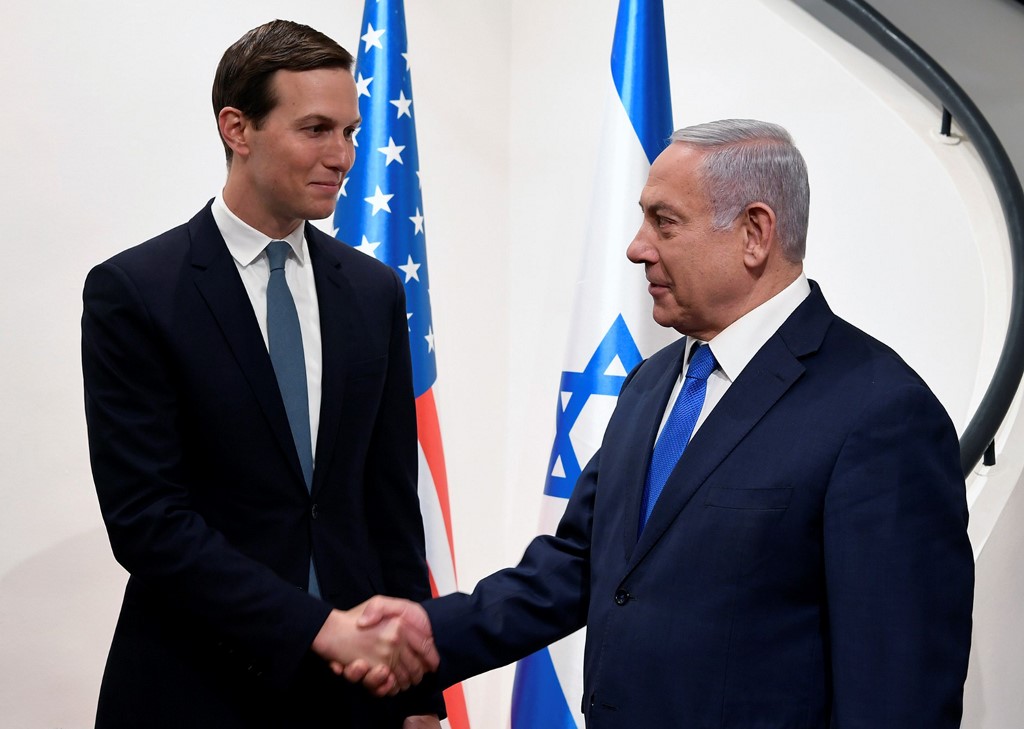Imagine if Rashida Tlaib, AOC and Ilhan Omar dictated a Middle East peace plan

The absurdity of this inverted 'peace' scenario should help us to understand the extreme nature of Trump's pro-Israeli policies
Just imagine the Israeli reaction to a peace plan put forward by a future US president elected to pursue the agenda of the “Squad”, appointing Noam Chomsky, the head of CAIR and Code Pink's Medea Benjamin to lead its moves towards peace in the Middle East.
Imagine, further, that prior to disclosing President Alexandria Ocasio-Cortez’s revolutionary peace initiative, Washington’s new leadership took the following unilateral steps: tabling a Security Council resolution calling for the dismantling of the Israeli separation wall, in accordance with the 2004 advisory opinion of the International Court of Justice; insisting on Israeli adherence to Article 49(6) of the Fourth Geneva Convention, while calling for the prompt resettlement of all Israeli settlers behind the 1967 Green Line; and informing Congress of its intention to discontinue further annual economic and military aid to Israel.
In addition to these “provocations”, imagine that the US energetically pursued regional diplomacy with neighbouring Arab states, in order to exert the greatest possible pressure on Israel to accede to whatever Washington proposes, or suffer severe, adverse consequences.
Balancing the scales
I know this would strike even most pro-Palestinian activist as an absurd way to seek sustainable and just peace arrangements, but this is precisely the road taken by the White House in its multiple acrobatic moves designed to build leverage for the Trump-Kushner “deal of the century”. Even former President Barack Obama’s feeble attempts to balance the scales ever so slightly brought fury to the lips of most Israelis, including their leaders.
Equally worth observing is the discourse on Trump diplomacy adopted by Zionist apologists, and even some anti-Trump liberals and Israeli peace activists.
We can hardly imagine the Israeli response to a peace initiative launched by Ilhan Omar, Rashida Tlaib and AOC along the above lines, which - for all of its seemingly radical character - would actually be reasonable from the perspective of international law and morality. The absurdity of this inverted “peace” scenario should help us understand how extreme President Donald Trump’s pro-Israeli brand of extremism has been.
Their bad faith message to Palestinians is along three parallel lines: not to repeat past mistakes by simply rejecting Trump’s peace proposals; that under the circumstances, Trump’s offer is the best Palestinians can hope for, given altered conditions on the ground; and not to reject in advance, but to listen, respond favourably to any positive elements, and project an image of constructive engagement.
Revealingly, such advice is set forth without any consideration of the extreme anti-Palestinian context created by a series of deliberate moves by Trump from the moment he was elected. Can you even imagine giving the Israeli leadership this kind of advice if the political realities were reversed?
Tilted diplomatic atmosphere
Palestinians are being chastised for not being receptive and refusing to come to the table with an open mind. True, the Palestinian Authority has not shown much finesse in handling the situation, relying on an ambivalent public “no”.
Better would have been an explanation along these lines: “Given the hostility towards Palestinian concerns that has been a trademark of the Trump presidency since its beginning, how can anyone in their right mind expect us to be so foolish as to pretend that there exists any basis for exploring the Trump-Kushner proposal as if it may offer a fair resolution to our long struggle for the most basic rights of the Palestinian people?”
Sitting down in such a tilted diplomatic atmosphere would be the height of folly for Palestinians, making them seem without dignity or understanding - mere puppets assembled so that their enemies could manipulate the strings.
 Israeli Prime Minister Benjamin Netanyahu shakes hands with US presidential adviser Jared Kushner in Jerusalem on 30 May (Matty Stern/US Embassy Jerusalem/AFP)
Israeli Prime Minister Benjamin Netanyahu shakes hands with US presidential adviser Jared Kushner in Jerusalem on 30 May (Matty Stern/US Embassy Jerusalem/AFP)
Palestinians could, and should, have done better in setting forth their own vision of peace. The extreme one-sidedness of the Trump approach handed Palestinians a golden opportunity to declare the urgent need for a new peace intermediary - not a partisan, as we’ve seen with past US presidents, or worse, an imposer, as this one seems to be.
The US had long overplayed its hand as an “honest broker”; now, it has gone so far as to make any further Palestinian acceptance of the US role a source of humiliation, if not a sign of political senility.
It is worth noticing how the background of pro-Israeli objectionable behaviour is treated in international commentary, which has been distorted by an underlying misinterpretation. What is being sought by Trump’s “peace diplomacy” is not a political compromise that takes into account the basic rights of the two peoples, but a victory of one side over the other.
Turning the screws
It is an approach lightly theorised by Daniel Pipes and his confederates at the Middle East Forum, seeking to justify and advocate an increase of coercive US and Israeli moves that will induce Palestinians to acknowledge political defeat and submit to conditions at the behest of the Israeli victor.
Thus, the success of the Trump-Netanyahu approach is not a matter of finding common ground between the two sides to reach an agreement, but turning the screws of oppression so tight that Palestinians will surrender.
The approach has relied on unilateral, punitive actions supplemented by regional and global geopolitical leverage, and the endorsement of Israeli excessive force in dealing with the Great March of Return over the past year and a half.
Against this backdrop, there is an opportunity for responsible Palestinian leaders to do more than sit sullenly on their hands.
In addition to explaining why Trump’s moves make the traditional US role unacceptable for the purposes of negotiation, Palestinians of all factions should do their utmost to set aside their disagreements and achieve a unity of purpose, at least for the duration of their national struggle.
Even more important may be to seize the diplomatic initiative by publicising a comprehensive peace proposal that stakes out the general contours of a political compromise on Jerusalem, settlements, statehood, borders, refugees, water, offshore resources, economic cooperation, security, and whatever else seems relevant.
Even if only in the form of a declaration of principles, it would manifest an intention to do more than refuse the paltry offerings that Kushner Inc is peddling throughout the region.
Public relations war
Such a positive initiative articulated by the Palestinian side is long overdue, and would aid Palestinians in the ongoing “public relations war” that may ultimately be as relevant to the political struggle as the diplomatic tug-of-war, or even resistance struggles.
At this stage, nothing would give greater weight to Palestinian demands than its backing of an approach to peace that would seem so much more reasonable and responsible than what is now being promoted by the Trump White House.
Context matters, and when it is eliminated, assessments of behaviour are bound to be distorted, especially if what is at stake is highly contested. This is particularly true for the unabashedly cruel Trump-Kushner approach to peace, which places a thin veil of deception over a concerted push to achieve an Israeli “victory” while pretending to seek peace on the basis of political compromise.
This emperor has no clothes. Those who care about justice must not let this happen.
Source: Richard Falk, Middle East Eye

WRITE YOUR COMMENT